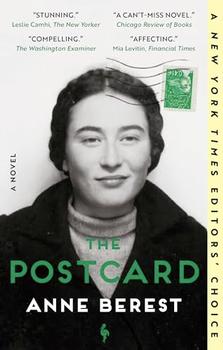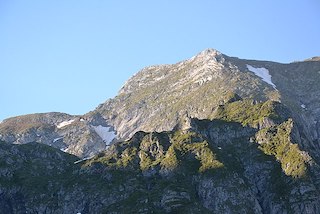Summary | Excerpt | Reading Guide | Reviews | Beyond the Book | Read-Alikes | Genres & Themes | Author Bio

This article relates to The Postcard
 In The Postcard, Jeanine Picabia, the author's grand-aunt, is a leader in the French Resistance movement. When she is betrayed, she becomes "one of the most wanted female fugitives in France." In December 1942, she flees to England by way of Spain, which she enters by crossing over the Pyrenees mountains. She takes a particularly challenging route, via Mont Valier, because "German soldiers won't go that way…it's too dangerous."
In The Postcard, Jeanine Picabia, the author's grand-aunt, is a leader in the French Resistance movement. When she is betrayed, she becomes "one of the most wanted female fugitives in France." In December 1942, she flees to England by way of Spain, which she enters by crossing over the Pyrenees mountains. She takes a particularly challenging route, via Mont Valier, because "German soldiers won't go that way…it's too dangerous."
The Pyrenees mountain range is Europe's second major range, after the Alps. It runs over 265 miles (430 km) between Spain and France, from the Atlantic to the Mediterranean, and separates the Iberian Peninsula (Spain and Portugal) from the rest of Europe. The range is distinctive because there are no low mountain passes; all are notoriously high and difficult to traverse in winter, even with skis.
In choosing this route of escape, Jeanine Picabia was not alone. According to essayist Margarita Gokun Silver, writing for The Forward, "With Hitler's army sweeping through Europe, many fled across the Pyrenees into Spain — officially neutral during the war — either to join the Allied troops or to emigrate. Among these refugees were European Jews escaping certain death."
Silver explains that success for these refugees largely depended upon when they crossed the Pyrenees as Spain's policies shifted during World War II. In the early years of the war, refugees were able to acquire transit visas. In the mid-1940s, however, the Franco government bowed to German pressure and halted all visas, deporting those caught crossing illegally. Silver writes that "Although the exact number of Jewish refugees that crossed the Pyrenees between 1939 and 1944 isn't known, historians estimate it to be somewhere between 20,000 and 35,000."
Also never to be forgotten were those Spaniards who had in the late 1930s crossed the Pyrenees in the other direction to escape the vengeful fascists winning the Spanish Civil War. When France fell to Germany in 1940, their fate was doubly sealed. According to journalist Nick Mead, "Many Spaniards were captured or handed over to the Nazis by the Vichy government, and ended up in the notorious Mauthausen concentration camp. These Spaniards were some of the first prisoners to be sent there, before the Jews arrived for extermination."
Today many people who cross the Pyrenees on foot do so, as I did, as part of the Camino de Santiago pilgrimage. The French Route begins in France and crosses into Spain through the Pyrenees, on a hike through some of the most beautiful landscape imaginable. On my first night of hiking, I stopped at the Orisson Refuge at the French base of the Pyrenees and spoke to a young woman who was walking the Camino in tribute to her great-grandparents who had escaped Spain into France at the close of the Spanish Civil War. It was a powerful experience to walk up and over the Napoleon pass the next day carrying in my thoughts her story, and the stories of all those who had walked before me.
Mont Valier from the Refuge Les Estagnous, courtesy of Wikimedia Commons
Filed under Places, Cultures & Identities
![]() This "beyond the book article" relates to The Postcard. It originally ran in June 2023 and has been updated for the
May 2024 paperback edition.
Go to magazine.
This "beyond the book article" relates to The Postcard. It originally ran in June 2023 and has been updated for the
May 2024 paperback edition.
Go to magazine.
When you are growing up there are two institutional places that affect you most powerfully: the church, which ...
Click Here to find out who said this, as well as discovering other famous literary quotes!
Your guide toexceptional books
BookBrowse seeks out and recommends the best in contemporary fiction and nonfiction—books that not only engage and entertain but also deepen our understanding of ourselves and the world around us.